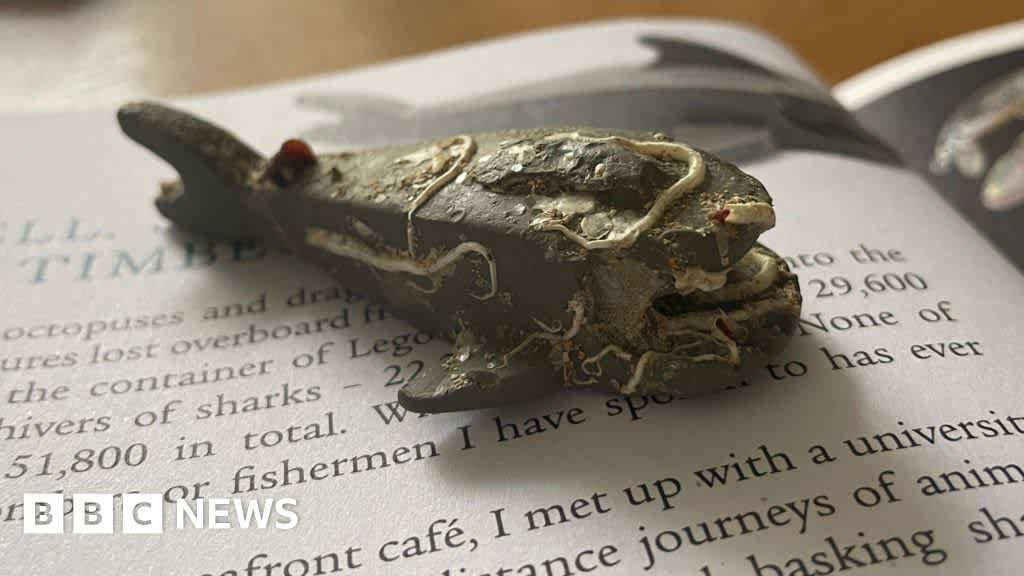Hundreds of pieces of Lego lost at sea off a cargo ship 27 years ago have been found this year, including the first ever shark.
A freak wave swept 62 shipping containers of Lego off the Tokio Express cargo ship 20 miles (32km) off Land’s End on 13 February 1997, one of which held 4,756,940 pieces, much of it sea-themed.
Since then, Lego parts have been found in south-west England, the Channel Islands, Wales, Ireland and as far away as the Netherlands and Norway.
Tracey Williams who founded the project Lego Lost at Sea said this year had seen a rise in the number of yellow spear guns found of the 53,120 that were lost.
Ms Williams said scuba tanks and flippers were the most common finds but the rarest discovery yet was the first Lego shark ever reported.
Richard West, a 35-year-old fisherman living in Plymouth, found the plastic toy on the top of his fishing nets 20 miles (32km) south of Penzance in August.
He said: “I could tell straight away what it was because I had Lego sharks in the pirate ship set when I was little.”
“It’s priceless – it’s treasure!” he added.
Ms Williams said the official Lego inventory showed that 22,200 dark grey Lego sharks and 29,600 light grey ones were in the lost container.
She said: “Interestingly, after Richard’s find, another Lego shark came to light – found not by a fisherman or fisherwoman in their nets but by Andrea Hunt from a beach in St Ives.
“The sharks sink, which explains why so few have been found.
“There are probably some 50,000-plus still lying on the seabed, some making their way ashore, others heading into deeper waters.”
In April, 14-year-old Liutauras found a Lego black octopus on Marazion beach, near Penzance, one of 4,200 swept off the cargo ship.
He said at the time he had collected almost 800 pieces of Lego from the sea spill but that he especially wanted to find a dragon, which were extremely rare.
By the end of the year, the teenager had found two of the 33,427 black Lego dragons from the cargo spill.
The majority of black dragons discovered to date have been on Cornish beaches, but they have also been found on a Brighton beach and on the Guernsey coastline.
Ms Williams said she was sent an interesting report from Norway in early December.
She said: “Back in 1997, oceanographer Dr Curtis Ebbesmeyer predicted ocean currents would carry the Lego ‘north past Norway into the Arctic Ocean’.
“Well, last week we heard from yacht delivery skipper Joe Willshire.
“He sent a picture of a blue Lego flipper he’s been carrying in his jacket pocket for the last five years – he found it on a beach in south-west Norway.”
She continued: “The aim of the Lego Lost At Sea Project is primarily to raise awareness of the problem of plastic in the ocean – how it gets there, what sinks, what floats, how long it lasts, how far it drifts – both on the surface of the ocean and along the seabed – and what happens to it over time and as it breaks apart.”
A crew of fishing vessel Crystal Sea sent the project a photo of the mass of Lego pieces they had hauled up from the seabed 20 miles (32km) off the Cornish coast during the summer.
The haul included two yellow life rafts, two of the 28,700 lost overboard from the Tokio Express.
Also fishing off the Cornish coast, another fisherman found a grey Lego panel caught in his nets, a piece that had never been reported before and one of 6,600 lost at sea.
Ms Williams said fishermen and women tended to find the larger plastic items in their nets such as door frames, windows and life rafts, while beachcombers were more likely to find lighter pieces like cutlasses, life jackets and spear guns.
She said no Lego magic wands, dragon wings or witches’ hats lost from the ship had yet been reported to have been found.
She asked anyone else who has found Lego from the spill to get in touch with the Lego Lost at Sea team so pieces could be added to the project’s map
Follow BBC Cornwall on X, Facebook and Instagram. Follow BBC Devon on X, Facebook and Instagram. Send your story ideas to [email protected]. Follow BBC Guernsey on X and Facebook. Follow BBC Jersey on X and Facebook. Send your story ideas to [email protected].
Source: www.bbc.com
